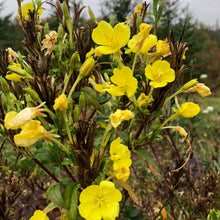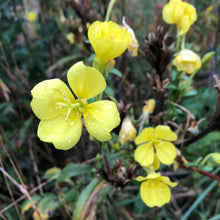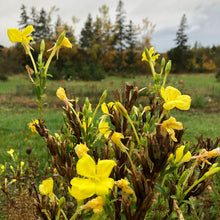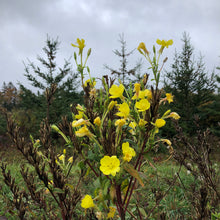Northern Evening Primrose
Flower
Regular price
$4.95
$4.95
Sale
Northern Evening Primrose (Oenothera parviflora) This is a similar species to 'Common Evening primrose' (O. biennis), however, there are a few notable differences that garner separate classification. Northern Primrose flowers are somewhat smaller, 4-petalled, lime-yellow in colour, and born on a more pronounced nodding spike. These plants are also much taller and exhibit a few physiological traits that also distinguishes them from O. biennis, such as pronounced sepal knobs and pronounced leaf venation. This biennial plant will naturalize itself quite easily in all soil types, but prefers well-drained soils. It will thrive in partial shade as well as it does in full sun. A prolific late season bloomer that attracts a multitude of pollinators. If you want to add some fall colour to your garden, this is an excellent choice. Primrose oil which is high in an essential fatty acid called gamma-linolenic, has traditionally been used to treat many conditions such as eczema, PMS, osteoporosis, and arthritis. A very useful landscape plant/herb to add in a semi-contained area of your garden. We have several blocks on our farm that continue to flower and stand out during the late weeks of fall and early winter.
Approx. 200 seeds per packet
Growing Information: This is a biennial, therefore the flower forms a rosette in the first year followed by florals in year 2. Seeds can be sown in late fall (surface sown) or must undergo cold stratification for 4-6 weeks in refrigeration if sown in spring. Surface sow seeds after risk of last frost is gone. Can be sown indoors 8 weeks before last frost in peat pots to prevent root disturbance. Direct seeding is recommended. Seeds germinate in 7-28 days. Seeds can be sown outdoors in the late fall to satisfy cold period required for spring germination.
Days to Germination: 7 - 28
Plant Spacing: 14"
Plant Height: 28-36"
Features:
Biennial
Hardiness Zones: 2b
Bloom Time: Late Summer to Late Fall
Light Requirements: Full Sun
Attracts Bees & Butterflies
Heat & Drought Resistant
Important Medicinal Properties








